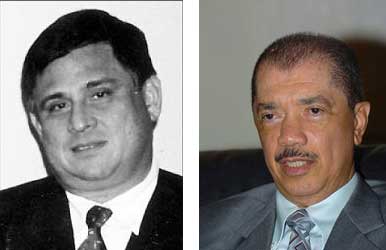


The Governor of the Central Bank chose Friday, the day this newspaper goes on sale, to appear on the State broadcasting media to announce that he had abandon his policy of manipulating the exchange rates of the rupee against the three major currencies which formed the so-called trade weighted basket. The choice of day for the announcement was significant, since it is Friday that Le Nouveau
His explanation on television left many people bewildered. The same goes for the official statement which was published in the government daily newspaper, Seychelles Nation and the Central Bank website. The first paragraph of the published statement in English let the cat out of the bag. “The Central Bank of
Here are the facts. Since October 2006, the Central Bank has been slowly devaluing the
For President Michel and the leadership of the SPPF there seemed to be no end in sight, as the cost of goods rose exponentially with the combined effects of the black market rates, price control, over invoicing and GST. Even SMB, it appears was in on the game, selling an imported UHT milk at SR23 a litre, three times the price of the one it produces locally. The tunnel remained completely dark for President Michel who saw not even a flicker of light. This was the nightmare scenario he had been assured by Chang Leng would not happen. Even the US$230,000,000 generated by peddling junk bonds on the international capital market could not make any difference in alleviating the situation. Not only have the supply essential materials such as cement, steel, timber and baby food remain haphazard at best, their prices have shot up considerably. To pile more misery, Michel in a desperate attempt to limit the mushrooming budget deficit increased taxes on fuel. The support base of the SPPF started to get jittery, openly condemning the leadership of the party. In short, after one year all the policy has generated is a lot of pain with virtually no gain at all. Under pressure Michel ordered his “yes” men to abandon the policy of devaluation. His famous “devaluation is not an option” speech has come back to hunt him much sooner than he had expected.
As usual, the time honoured excuse is put to good use. As it was for the U-turn on the return to multiparty system and the abandoning of the NYS policy, the justification for the u-turn or abandonment of the devaluation policy is to claim that it had achieved its objectives, except that Francis Chang Leng is less refined in his presentation and justification. He tried to give the impression that all along the exchange rate for the US dollar he was targeting was SR8, when there was no target when it all started a year ago. The target seems to have been identified only after it has been hit by reality.
Nothing could be more unstable for an economy than an exchange rate that keeps changing forever with no end in sight while being manipulated by the very monetary authority tasked with keeping it stable. Yet it did not prevent Chang Leng from claiming in his statement that all this instability over one whole year was done in order to “bring greater stability” to the national economy.
Not to be undone, the Minister of Finance, Danny Faure went to the National Assembly this week to announce that SPPF would impose a minimum wage on the private sector employment while it would grant a wage increase to the public sector, a move that serves only to negate the competitiveness benefits of devaluation by increasing the cost of inputs. As regards “competitiveness”, devaluation only provides benefits in relative terms. Real competitiveness is achieved by producing goods and services at a lower costs than your competitors – in other words productivity gains.
It seems that by strictly adhering to Chang-Leng’s flawed economic advice, President James Michel has managed to single-handedly plunge